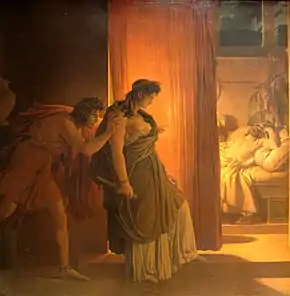Against the Stepmother for Poisoning
"Against the Stepmother for Poisoning" (Ancient Greek: Φαρμακείας κατὰ τῆς μητρυιᾶς) is one of fifteen extant speeches by the Athenian orator Antiphon. It is a speech for the prosecution in the case of a woman accused by her stepson of arranging for the murder of his father, her husband. As with most surviving legal speeches from classical Athens, the outcome of the case is unknown.
Background
The speech was given as part of a trial of a woman for killing her husband some years previously.[1] The husband had visited his friend Philoneus and had dinner with him; both had died, Philoneus at dinner and the husband twenty days later.[2] Philoneus' mistress was tortured and executed for murder.[3] "Against the Stepmother" is a speech for the prosecution by the son of Philoneus' friend against his stepmother.[3] The defence was conducted by the litigant's half-brother, the son of the woman on trial.[4]
The charge brought against the stepmother was probably homicide (φονος, phonos).[5] If it was, the case would have been tried at the Areopagus, which dealt with murder cases, including deaths caused by pharmaka (φαρμακα, "drugs").[6] Alternatively, it may have been bouleusis (βουλευσις, "planning") of homicide.[7] In that case, it would have been tried at the Palladion.[7]
The exact date of the speech is uncertain, though it is likely to have been composed in the final decade of Antiphon's life (421–411 BC).[8] K.J. Dover suggests that "Against the Stepmother" was produced after what is now known as Antiphon's sixth speech, but before the fifth.[9] Therefore, Dover dates the speech to between 419 and 414 BC.[10] Other scholars, however, consider that "Against the Stepmother" was the earliest of Antiphon's surviving speeches, with Michael Edwards arguing that the speech dates to some time before 421.[11]
Speech

The speech, written for the prosecution in a murder trial, is Antiphon's only surviving speech for the prosecution.[12] The plaintiff accuses his stepmother of having murdered his father while he was a child.[13] The speech attempts to prove that the stepmother arranged for her husband to be given a drug with the intention of killing him.[14] The case rests on the argument that the stepmother persuaded another woman, the mistress of her husband's friend Philoneus, to poison her husband. The speaker never explains how he came to learn of this conspiracy, and Victoria Wohl says that he may have made it up entirely.[15]
Aside from the assertion that the stepmother had previously attempted to poison her husband, the speaker provides no evidence of his claims. Instead, he appeals to the jurors' fear of betrayal by their wives, and compares his stepmother's actions to those of Clytemnestra murdering Agamemnon.[1] Esther Eidinow notes that the speech is also reminiscent of the story of Medea,[6] while Victoria Wohl draws comparison to the myth of Deianira told in Sophocles' Women of Trachis.[16]
As women were not allowed to represent themselves in court in classical Athens, the stepmother seems to have been represented by her sons.[13] The speech for the defence does not survive, but it may have argued that the stepmother had not intended to kill her husband, merely to give him a love potion.[13] The Magna Moralia discusses a similar case where a woman was acquitted based on the defence that she was not trying to kill her husband, but was acting out of love.[1]
The charge, brought many years after the event, may have been motivated by a dispute over inheritance.{sfn|Wohl|2010|loc=n.54}} As with most surviving Athenian legal speeches, the outcome of the case is unknown.[17] Scholars have generally considered the prosecution case to be extremely weak.[18] Patricia A. Watson notes that the speaker fails to explain the stepmother's motive in poisoning her husband.[19] However, Michael Gagarin argues that while the evidence provided by the prosecution is weak, the story told is nonetheless effective, and might still have resulted in a successful prosecution.[18] On the other hand, Wohl suggests that this strategy might have backfired if the tragic allusions in Antiphon's speech instead brought to mind a more sympathetic character, such as Deianira.[20]
Notes
- Gagarin & MacDowell 1998, p. 9.
- Gagarin 2002, p. 147.
- Eidinow 2016, p. 34.
- Gagarin 2002, p. 146.
- Gagarin 1997, p. 104.
- Eidinow 2016, p. 35.
- Carey 1997, p. 36.
- Gagarin 2002, p. 139.
- Dover 1950, p. 53.
- Dover 1950, p. 44.
- Edwards 2000, p. 236.
- Gagarin 1997, p. 105.
- Wohl 2010, p. 43.
- Wohl 2010, p. 44.
- Wohl 2010, p. 45.
- Wohl 2010, p. 51.
- Wohl 2010, p. 64.
- Gagarin 2003, p. 205.
- Watson 1995, p. 55.
- Wohl 2010, p. 63.
References
- Carey, Christopher. Trials from Classical Athens. London: Routledge.CS1 maint: ref=harv (link)
- Dover, K.J. (1950). "The Chronology of Antiphon's Speeches". The Classical Quarterly. 44 (1).CS1 maint: ref=harv (link)
- Edwards, Michael J. (2000). "Antiphon and the Beginnings of Athenian Literary Oratory". Rhetorica: A Journal of the History of Rhetoric. 18 (3).CS1 maint: ref=harv (link)
- Eidinow, Esther (2016). Envy, Poison, and Death: Women on Trial in Classical Athens. Oxford: Oxford University Press.CS1 maint: ref=harv (link)
- Gagarin, Michael (1997). Antiphon: The Speeches. Cambridge: Cambridge University Press.CS1 maint: ref=harv (link)
- Gagarin, Michael (2002). Antiphon the Athenian. Austin: University of Texas Press.CS1 maint: ref=harv (link)
- Gagarin, Michael (2003). "Telling Stories in Athenian Law". Transactions of the American Philological Association. 133.CS1 maint: ref=harv (link)
- Gagarin, Michael; MacDowell, Douglas M. (1998). Antiphon and Andocides. Austin, Texas: University of Texas Press. ISBN 978-0-292-72808-0.CS1 maint: ref=harv (link)
- Watson, Patricia A. (1995). Ancient Stepmothers: Myth, Misogyny, and Reality. Leiden: Brill.CS1 maint: ref=harv (link)
- Wohl, Victoria (2010). "A Tragic Case of Poisoning: Intention Between Tragedy and the Law". Transactions of the American Philological Association. 140 (1).CS1 maint: ref=harv (link)